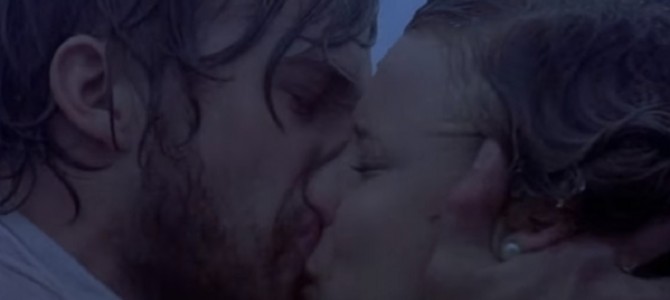
When I was in high school and college, every girl’s favorite movie was “The Notebook.” Since I’d never seen it, I started to put together a conception of the movie from the smatterings of conversation I heard. It was obviously sentimental and sweet: a story of two lovers who build a life together and grow inseparable in their old age.
So I was surprised when, upon actually watching the movie, I saw what it actually was about: a summer romance between two teenagers, cut short until the girl comes back and—despite being engaged—cheats on her fiancé with an old high school crush. Lots of steamy sex and kissing in the rain is involved. Somehow, this affair leads to a lifelong, prosperous, strong marriage. Hmm.
I remember watching this movie and wondering why it was so popular. Perhaps because of the regular doses of Jane Austen I had growing up, my conception of love was quite different: her novels set a high moral standard, while also describing relationships full of friendship and faithfulness. I loved Mr. Knightley from Austen’s “Emma,” who joked and laughed, and rebuked and scolded, the love of his life.
He and Emma were best friends far before they were romantically interested in each other, and their relationship was as full of apologies as it was of repartee and romance. There was also “Sense and Sensibility,” in which the “perfect” romantic man ends up being a dangerous façade (sorry, spoiler alert), whereas the neglected, kind Colonel Brandon—despite his lack of Byronic polish and drama—becomes the perfect romantic hero in the end.
Perfect in Every Way, Except Character
Austen proffered woman protagonists who were real—even embarrassingly so at times. Emma Woodhouse humiliates a kind elderly woman at a picnic, and is miserable when she sees her vanity and wit have gotten the better of her. Marianne Dashwood (“Sense and Sensibility”) realizes romantic sentiment has led her astray, and rediscovers the importance of prudence. Elizabeth Bennet (“Pride and Prejudice”) learns that her impetuous, instantaneous opinion-forming has made a fool of her, even put others in danger.
Austen’s women are real: not perfectly pretty, not flawless. They have embarrassing families and frustrated circumstances, impetuous conversations and regret-ridden nights.
Nicholas Sparks, however, offers us protagonists who shine with perfection. Although some may come from “flawed” circumstances—Dawson Cole in “Best of Me” has a dangerous, crime-ridden family—the characters themselves are pretty much perfect. Circumstances drive the protagonists apart, but they remain lovely and loved. As Heather Havrilesky writes for BookForum,
There are a few ironclad rules in any world created by Nicholas Sparks. If you’re a man, you have square shoulders and muscles that reflect your belief in a hard day’s work. If you’re a woman, you have striking emerald eyes and blond hair, or hazel eyes to offset your high cheekbones. … If you have a job, you rise to the top quickly and soon you’re running the whole operation. If you work ninety hours a week, you show no signs of fatigue. If you’re sent away to the war, you’re never far from the action. If you’re a painter, your paintings are eventually displayed in museums around the world. If you’re poor, you still always have enough to eat and a warm room to sleep in. If you’re pretty, you don’t realize it. If you’re older, you don’t regret it.
The Nicholas Sparks Man Doesn’t Exist
The men in particular seem to follow a formula that draws women with tantalizing power. As GQ writer Andrew Corsello wrote, men increasingly have “their manhoods measured and molded by Nicholas Sparks and the code of morality, lovemaking, and letter writing his male heroes follow.” Corsello describes this code of manliness thus:
The Nicholas Sparks Man is rugged and good with his hands. He may have an improbable but sympathy-inducing tragedy in his past. No, the Nicholas Sparks man is not verbal. Except—and it’s a tentacular exception—when he’s writing love letters. Which he does steroidogenically. One every day for a year! (The Notebook.) … No matter how colorful he gets with his wordplay, the Nicholas Sparks Man does not curse. Ever. … The NS Man first falls in love, and at first sight (one clue to this: the 2005 Nicholas Sparks novel At First Sight), performing all due diligence, and then, only then, makes love. Very gently. With (preferably ‘with,’ not ‘to’) one, and only one, woman.
Thousands of women, young and old, have fallen in love with the Nicholas Sparks Man. As Corsello writes, “if you’re a man dating or married to one of these women, you are in his thrall—that is, the romantic standard set by the Nicholas Sparks Man that you will never live up to.”
I believe a lot of my peers grew up waiting for this Nicholas Sparks Man to emerge from the fray: someone quiet and brooding, impossibly handsome, gentle and sensitive, super well-read; someone who would love them at first sight, have marriage on his mind immediately; someone who would never look at another woman twice.
Austen helped me understand that misunderstanding and woundedness are often part of our relationships—but when accompanied by a desire to right wrongs and understand each other better, these things can be overcome. In contrast, Sparks tells his readers that misunderstanding and woundedness are signs of a wrong relationship, and that really, you should just go back to that idyllic moment in your past when everything was right. Obviously, the grass on the other side of the fence is not just always greener, it is actually always available to you. At least if you live in Sparks’ world.
Often, Listening to Hormones Means Disaster
If there’s a husband in the way of the Nicholas Sparks lovers, he’ll kick the bucket soon enough. No adultery necessary. If there’s a fiancé, the Nicholas Sparks Woman will explain the circumstances and be excused for cheating. I think that’s what bugged me most about “The Notebook”—while Sparks told Corsello that his books do not encourage adultery, he creates worlds in which adultery or other similar sins are not necessary, because everything just “works out” in the nick of time.
It’s a good thing, too, because each Sparks novel reinforces the idea that love is outside of our control—a torrential emotion that overwhelms us, that forces us into decisions or moments we cannot back away from or turn down. As Noah Calhoun puts it in “The Notebook,” “Poets often describe love as an emotion that we can’t control, one that overwhelms logic and common sense. That’s what it was like for me. I didn’t plan on falling in love with you, and I doubt if you planned on falling in love with me. But once we met, it was clear that neither of us could control what was happening to us.”
Sparks’s books create scenarios in which this pathos-driven, lust-filled “love” dominates the life trajectories of its protagonists, yet no one gets hurt in the end. This, writes Buzzfeed’s Anne Helen Peterson, is a potent fantasy for modern readers: “The Notebook and the rest of the Sparks genre are escapism,” she writes. “They’re melodramatic. But they’re also a coping mechanism, and an expression of frustration with a world that’s increasingly difficult for women—and men—to safely navigate.”
Sparks’ novels are a form of porn, she argues: just as porn replaces real intimacy, “propagating unrealistic sexual and physical ideals in the process,” many readers “use Sparks narratives to replace the lack of emotional intimacy and satisfaction in their own lives and, as a result, cultivate unrealistic ideals about what a relationship — and love — should resemble.”
So if you’re a Nicholas Sparks fan, I want to offer a few words of caution, with a recommended book list for you to consider at the end.
The Nicholas Sparks Man Is Not Real
I hate to say this, partly because some of you may think I’m just being embittered or haven’t interacted with enough nice guys. But I’m telling you. He’s not out there.
I’m saying that partly because I am married to an extremely handsome, buff, sweet, sensitive, quiet man who says he loved me almost from the first moment he met me. He’s got the square shoulders, the woodworking and car-fixing skills, the military background. He checks a lot of the Nicholas Sparks Man boxes.
But there’s a catch: he isn’t a huge fan of poetry, doesn’t come from a troubled or tragic past, isn’t a huge fan of writing letters, and is a man of few—practical, kind, commonsensical—words. The saccharine sweetness of Sparks novels and movies is repulsive to him.
Point being: you will never meet a guy who fits all the Sparks stereotypes. Maybe a few—but never all. (Except, GQ suggests, perhaps Sparks himself.) That means the more you become enamored with a Nicholas Sparks Man, the more you are setting up for yourself a false conception of what romance can or will be. You will look for a “Mr. Right” who is impossible to find.
The Nicholas Sparks Woman Is Not Real
Can we all just breathe a sigh of relief? The Nicholas Sparks Woman is always perfectly, breathtakingly beautiful, and only becomes more beautiful with age. Menopause, wrinkles, stretch marks, saggy boobs? Not for the Nicholas Sparks Woman! She never loses her charm or loveliness. Any lines around her eyes only accentuate their emerald brilliance.
She’s the perfect combo of caring, cute, impetuous, and mysterious. She is never annoying or demanding. She usually has some perfectly glorious talent that she’ll neglect if not for the Nicholas Sparks Man—like painting, or playing piano. She’s always great with kids, and any quirks or supposed “vices” she might have are merely cute, silly, or easily forgivable.
This woman doesn’t exist, and it’s better that she does not. We all need to binge on chocolate ice cream when we’re upset sometimes, or let mascara streak down our faces when we cry. We should pursue our talents regardless of whether that rakishly handsome ex-boyfriend told us to. And we shouldn’t worry about whether we age beautifully—but rather, whether we age gracefully.
Sparks’ work hasn’t yet captured a woman in all her complex, messy, beautiful ordinariness. Better to admire the chastened Emma Woodhouse or Marianne Dashwood—the woman who learns from her mistakes and grows better for acknowledging them—than holding up the woman who never makes mistakes, and so never has to apologize for them.
The Grass Is Not Usually Greener on the Other Side
In the Nicholas Sparks world, men and women are “fated” to be together. Cruel parents or difficult life circumstances might drive them apart at first, but when they find each other again, their wild attraction and wonderful conversations never fail to reunite them. They were always meant to be together. Whatever love interest or familial obligation is in the way, Sparks will magically make it disappear, with the flick of his literary wand and insertion of the perfect plot twist. Everyone lives happily ever after.
Except this is not usually how life works. Usually when we start pining for some magical moment in our past, thinking to ourselves, “If only,” we’re setting ourselves up for massive destruction—to our own hearts and emotions, as well as to our relationships. We will begin to feel bitter and unhappy about our own lot in life, and will find ourselves tempted to flirt with infidelity, to tease the edges of betrayal.
Sparks is not God. Or, God does not act like Nicholas Sparks. Either way, he is not going to kill off your husband with cancer or a car crash at the perfect moment. He will not let you off the hook so easily. The truth is that marriage, no matter who you’re married to, will reveal the worst in you and your spouse. But that’s sort of the point. As Tim Keller writes in “The Meaning of Marriage,”
When people first begin to see the flaws in their spouses, some flee the marriage. Others just withdraw, downscaling their expectations of happiness almost completely and just learn to get along. Others go into a long period of fighting and blaming their spouses for their unhappiness. All of these approaches share one thing in common, however. One spouse looks at his or her spouse’s weaknesses and says, ‘I need to find someone better than this.’ But … the someone better is the spouse you already have. God has indeed given us a desire for the perfect spouse, but you should seek it in the one to whom you’re married. Why discard this partner for someone else only to discover that person’s deep, hidden flaws? Some people with serial marriages go through the cycle of infatuation, disillusionment, rejection, and flight to someone else—over and over. The only way you’re going to actually begin to see another person’s glory-self is to stick with him or her.
When “The Notebook” paints Noah and Allie’s summer romance as the happiest of their lives, it forgets to note that summers of our youth are often the happiest of our lives, and that teenage romance is the easiest of our lives. Such relationships and times are carefree, innocent, responsibility-free. It’s what comes after that makes us into adults. It is what comes after that makes us into loving, faithful, loyal lovers.
The experiences that are tragic, frustrating, annoying, comic, and crushing slowly teach us to be self-controlled, persevering, gentle, and kind. The process of loving someone through such circumstances teaches us to keep a marriage alive.
Love Is Something You Can Control
A very important misconception often plagues modern discourse about love: we’re told that chemistry, “the spark,” is love. But it’s not. It’s just attraction: a form of lust and longing that stirs in you when you meet someone who fits the conception you have of the man or woman of your dreams. Tall, dark, and handsome. Someone who loves poetry. Someone who actually listens to you. Someone who makes your heart flutter.
Sure, these things can be ingredients in a loving, lasting relationship. But they don’t make such relationships. Often enough, on their own, they can lead to horrible, painful things like affairs, adultery, and divorce.
This is the potent lie of “The Notebook”: that not only is love something you can’t control, but that chemistry is something you cannot deny. When teenage girls read a book or watch a movie that touts such claims, it sets them up for a world of hurt. It teaches them emotion should triumph over reason, that love is some wild and uncontrollable torrent of passion that cannot be tamed or understood.
But while passion is definitely an important part of romance, it cannot be the foundation. The foundation must be virtuous, self-sacrificing love. Love is patient, kind, not self-seeking, trusting, hopeful, and perseverant (1 Corinthians 13). Love persists—even when tragedy strikes, markets crash, boobs get saggy, cancer surprises, flaws and vices rise to the surface. Love goes on. Not in spite of our wills, but because of them.
I would like to acknowledge a perfectly understandable rebuttal at this point. “So what, if Nicholas Sparks is fake?” you may ask. “Isn’t that the point of romantic fiction—to be fun, titillating, sentimental, and entirely NOT real?”
Sure. That’s fine, if that’s your cup of tea. Just so long as you don’t confuse such stories with anything remotely close to real life, real romance, or real love.
Books Better than Emotional Porn
Here’s where I give you my recommended booklist. You can read books about romance and love without wallowing in Sparks’ emotional porn. So if you want to read some great books, here are a few favorites.
Warning: they’re not all romances. But in them, you’ll discover that 1) flawed people can actually have great marriages, 2) great kisses can happen without thunderstorms, rain, or any other form of torrential downpour, and 3) true love takes hard work. I’ve thrown in a few without happy endings, in case you still want a good cry at the end.
“Emma,” by Jane Austen. In which a selfish, willful young woman learns many lessons about what virtuous friendship ought to look like, and marries a man who brings out the best in her. Also, any other book by Jane Austen should be read. Immediately.
“Jane Eyre,” by Charlotte Brontë. In which two people discover what it means to exercise restraint and moral courage in the face of passion, and grow stronger in their own personal lives for the journey.
“Laddie,” by Gene Stratton Porter. A book about a young man who pursues the woman of his dreams despite many challenges, filled with anecdotes from the lives of his parents, a husband and wife who’ve grown old together and learned from each other.
“Anna Karenina,” by Leo Tolstoy. One of the most beautiful, tragic novels about love, lust, and the sanctity of marriage. A flat denial of the idea that the grass is greener on the other side of the fence, alongside a beautiful call to gratitude, wonder, and faith.
“Jayber Crow,” by Wendell Berry. A story about unrequited love—but one that defies stereotypes and assumptions about how we should respond when we love without being loved in return.
“What Alice Forgot,” by Liane Moriarty. In which a woman forgets the last twenty years of her life, and has to discover why her marriage is falling apart—and try to bring it back from the dead.
“Against the backdrop of an increasingly unpredictable global scene, Sparks’s worldview feels almost like a religion: Maximize sentimentality, minimize complexity,” Havrilesky writes. “Here is the short answer. Here is the simple solution.”
But love isn’t about short answers or simple solutions, perfect people or perfect romances. Love is about the husband who cares for his wife of 59 years, only to watch her die. Love is about the college boyfriend who breaks your heart, and never looks back—and it’s about the lessons you draw from that experience.
Love is about the moments when you and your spouse argue—seriously or foolishly, heatedly or wearily—then kiss and choose to forget. Love is about walking down the aisle and saying “until death do us part,” and meaning it with all of your heart and soul.
Love is patient, love is kind. It doesn’t always mean kisses in the rain or rainbows after thunderstorms or fields of wildflowers. But it does mean passion, purpose, and joy. That’s better—and more romantic—than any Nicholas Sparks Man or Woman might guess.









